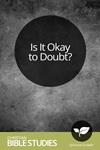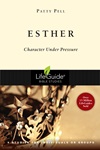Many of us have asked if it’s okay to doubt our faith, but maybe the question should be, is it okay not to doubt. Shouldn’t we all be asking questions about what we believe?
In Scripture, believers are instructed to aggressively pursue all sides of faith: spiritual, intellectual, and emotional. In Deuteronomy 6:5, Moses instructs the children of Israel to love the Lord their God with their hearts, their souls, and their strength. In Matthew 22:37, Jesus splits the atom even further when he adds that we are to love the Lord our God with our minds as well. Yet, the moment our minds begin questioning our beliefs, we’re overcome with guilt and fear.
I remember visiting my mother-in-law one afternoon soon after I graduated from college. I was struggling with doubts, and I was troubled by them. I was looking for some kind of comfort, so I decided to broach the subject with her. She was an extraordinary person who was blessed with a cheery disposition and rarely complained—though, from where I stood, I could have pointed out lots of reasons she could have. She had grown up in her faith, was reared in parochial school, and rarely missed church services.
On that particular day, as a secret storm raged within me, I asked her if she ever questioned her faith. I watched for her reaction as she stood folding laundry still warm from the dryer. She paused, looked at me, and said, “No, never. We were taught not to ask questions.” Then, she resumed her chore contentedly as I sat in amazement, wondering why I couldn’t be more like her. Why was I tortured with so many questions? Why couldn’t I be satisfied with someone else doing my thinking for me?
We can all come up with lots of reasons for not wanting to ask the big questions. We don’t want to appear vulnerable or confused. We were taught that our inquiries are a sign of disrespect or unbelief. We are afraid our faith will buckle under the bright lights of interrogation. Some of us sidestep investigations altogether, fearing that God will somehow be offended. But if God is really God, how could he ever be threatened by us? If our faith is rooted in truth and our ability to reason is a gift from God, shouldn’t he be able to handle any question we come up with?
Many of us spend the first decade of our lives believing everything our parents tell us. But in the second decade, things tend to change dramatically. Not only do we begin to challenge what our parents tell us, but we sometimes wonder if they’ve ever had a clue. It’s almost a rite of passage, I think to myself, every time I remind my kids how cool I was before they came along.
I was 19 when my sister walked into my room and asked why I was crying. When I told her my dad had said some things I didn’t agree with, she looked at me knowingly and asked, “Has it ever occurred to you that Dad might actually be wrong?” I stood there, realizing for the first time that no, it hadn’t. I pondered for a few moments this strange new concept. It felt a bit disquieting yet strangely liberating.
According to child psychologists, learning to think for ourselves is not only as normal but a healthy sign of development. It’s part of growing up. And so it is on our journey of faith. At some point, if we want to move into the kind of intimacy with God that he desires, we need to grow up and become both enlightened and informed. We need to come to terms with our parents and teachers, our experiences in life, or any kind of truth claim that may have taken root within us. We need to ask ourselves what we believe and why we believe it.
For me, doubt was a painful experience, but ultimately it shaped me into the kind of teacher I am today. Asking questions is how God prepared me to teach others. He placed within me a thirst for knowledge, and then wonderfully quenched it with his truth. In 1 Peter 3:15, the apostle instructs all believers to be ready to give a reason for the hope they have. The truth we often overlook, though, is that we can’t be ready with answers unless we first ask the questions ourselves.
Ann C. Sullivan is the author of Permission to Doubt and a speaker who is passionate about challenging and encouraging people in their faith.











